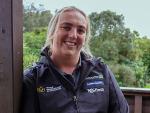Hawke's Bay and Gisborne winegrowers were hit hardest by Cyclone Gabrielle, capping off an inclement season already beset with disease pressure.
But despite the grim stories of lost crops and broken vineyards, both regions have yielded stories of successful harvests, against the odds, thanks to determined viticulturists, winemakers, vineyard managers and workers, supported by caring communities.
In the VineFacts sent to members on 9 March, Plant & Food Research data cruncher Rob Agnew reveals that Gisborne was hit by 460.3mm of rain in February, which is 655% of its LTA of 70.2mm. The Matawhero-Awapuni met station in Gisborne recorded 195.8mm in the 24 hours ending 9am on 14 February, with 246.7mm of rain in a 72-hour period ending 9am on 15 February.
Mark Thomspon, Chief Winemaker at GisVin and Chair of Gisborne Winegrowers Association, says the flooding had less impact on long term infrastructure in Gisborne than Hawke's Bay, although some rows were destroyed. But there have been crop losses, with access issues on silt and flood-affected vineyards making harvest impossible for some, while others have come in with light yields. The rain has caused a reasonable amount of splitting, and while a spell of fine weather mid-March meant fruit could dry out, lower than desired temperatures mean it's taking longer than expected, Mark says.
Gisborne has had a great run of good seasons, and he hopes growers will have the reserves required to get through this tough year. "On the plus side, we've been pulling in Chardonnay this week and that's bloody good," he adds. "And there's always next year."
In Hawke's Bay there was 277.1mm of rainfall in February, at 509% of the LTA of 54.4mm. The Lawn Road weather station recorded 129.6mm of that total in the 24 hours ending 9am on 14 February 2023. As with Gisborne, the rain came in the wake of an already wet growing season, with 193% of LTA rain recorded in the five months from September to January, Rob says.
Sacred Hill Chief Winemaker Nick Picone says his team are working hard to get the best result out of the season. "If there's one thing over the years I have learned, it's not to write off any harvest," he says, fresh from the intrepid tractor rescue of a stranded block of Hawke's Bay Chardonnay. "You can be really surprised and in fact amazed, as I have been over the years, about what you can make out of challenging vintages. And I find it personally rewarding, in sort of a weird way, to make really good wine in a tough year."
There's disease pressure across the region, but winegrowers have plenty in the toolbox to address that, Nick says. And while sugars are down, he is seeing some good flavours and nice clean fruit. That includes Chardonnay at Riflemans, the free draining site of the recent rescue, where remaining fruit is clean with "good potential", awaiting a handpick in late March.
"I know some have been hit so hard, but we thankfully have the ability to carry on and hopefully make some good wines," Nick says. "Let's face it, we won't forget this in a hurry." That statement was true of the Covid vintages as well, and he's beginning to wonder whether 'normal' still exists, as wine companies become accustomed to staying on their toes and adapting when the next challenge comes at them. "You never know what you're going to get."
Meanwhile, speaking from one of Sacred Hill's Wairarapa blocks while tasting "some really good Sauvignon Blanc", there's still plenty to get excited about in vintage 2023, Nick says.












